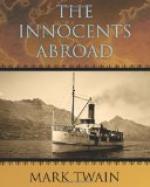“Why it’s Scylla and Charybdis.”
“Scylla and Cha—confound it, I thought it was Sodom and Gomorrah!”
And he closed up his glass and went below. The above is the ship story. Its plausibility is marred a little by the fact that the Oracle was not a biblical student, and did not spend much of his time instructing himself about Scriptural localities.—They say the Oracle complains, in this hot weather, lately, that the only beverage in the ship that is passable, is the butter. He did not mean butter, of course, but inasmuch as that article remains in a melted state now since we are out of ice, it is fair to give him the credit of getting one long word in the right place, anyhow, for once in his life. He said, in Rome, that the Pope was a noble-looking old man, but he never did think much of his Iliad.
We spent one pleasant day skirting along the Isles of Greece. They are very mountainous. Their prevailing tints are gray and brown, approaching to red. Little white villages surrounded by trees, nestle in the valleys or roost upon the lofty perpendicular sea-walls.
We had one fine sunset—a rich carmine flush that suffused the western sky and cast a ruddy glow far over the sea.—Fine sunsets seem to be rare in this part of the world—or at least, striking ones. They are soft, sensuous, lovely—they are exquisite refined, effeminate, but we have seen no sunsets here yet like the gorgeous conflagrations that flame in the track of the sinking sun in our high northern latitudes.
But what were sunsets to us, with the wild excitement upon us of approaching the most renowned of cities! What cared we for outward visions, when Agamemnon, Achilles, and a thousand other heroes of the great Past were marching in ghostly procession through our fancies? What were sunsets to us, who were about to live and breathe and walk in actual Athens; yea, and go far down into the dead centuries and bid in person for the slaves, Diogenes and Plato, in the public market-place, or gossip with the neighbors about the siege of Troy or the splendid deeds of Marathon? We scorned to consider sunsets.
We arrived, and entered the ancient harbor of the Piraeus at last. We dropped anchor within half a mile of the village. Away off, across the undulating Plain of Attica, could be seen a little square-topped hill with a something on it, which our glasses soon discovered to be the ruined edifices of the citadel of the Athenians, and most prominent among them loomed the venerable Parthenon. So exquisitely clear and pure is this wonderful atmosphere that every column of the noble structure was discernible through the telescope, and even the smaller ruins about it assumed some semblance of shape. This at a distance of five or six miles. In the valley, near the Acropolis, (the square-topped hill before spoken of,) Athens itself could be vaguely made out with an ordinary lorgnette. Every body was anxious to get ashore and visit these classic localities as quickly as possible. No land we had yet seen had aroused such universal interest among the passengers.




